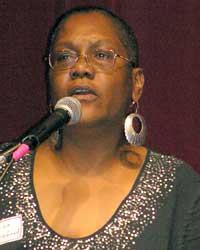Importance of Katrina struggle
Published May 19, 2006 10:17 PM
|
Monica Moorehead
WW photo
|
In his document, “Build a Black-Brown Alliance for Justice and Human
Rights,” Saladin Muhammad writes: “Hurricane Katrina was a
21st-century snapshot of the genocidal direction of the U.S. government. It
exposed the reality of conditions faced by working-class African Americans and
people of color under U.S.-style demo cracy. There has yet to be a massive
upsurge that expresses the deep outrage of the African American masses against
the U.S. government for this crime against humanity.”
If the greedy
capitalist developers and the corrupt politicians are able to get away with
premeditated mass murder, if they are able carry out a racist gentrification of
New Orleans without defiant resistance from a mass movement, then this would
prove to be a historical blow to the African American struggle for the right to
self-deter mination in the South with huge ramifications in this country and
internationally.
The struggle to rebuild the Gulf Coast should be viewed
as an unfinished stage of a revolutionary process that began with the first
Reconstruction after the Civil War. That first stage was drowned in a bloody
betrayal with a full-blown counter-revolution when the federal government
abandoned the newly-freed Black people, fighting for full democratic rights,
leaving them defenseless and powerless when it came to KKK terror and
semi-slavery conditions in the South. Black people became isolated after slavery
just as they were isolated during Katrina. So what we are seeing today are
Katrina survivors who have had their right to self-determination once again
trampled upon by this racist government.
Even the right to vote,
supposedly a basic guarantee under a capitalist democracy, is being taken away
from the Black population in New Orleans, a city that used to be at least 70
percent Black. When the municipal elections took place in New Orleans last
month, a reported 31 percent of the Black registered voters took part in the
elections, which resulted in a run-off election a week from today. This
percentage is down from 45 percent of Black voters who participated in the 2002
elections, according to the Associated Press. There were no polling places set
up for dispersed Orlean ians in Houston, Atlanta and other cities with large
numbers of Katrina survivors.
The bigger question is what kind of real
commitment will the rest of the movement make in order to elevate the struggle
of the Katrina survivors in a meaningful way. This is tantamount to elevating
the struggle against racism and national oppression and will help forge class
unity with all workers, including white workers.
Why isn’t the
anti-war movement finding a way to support Katrina survivors with all of its
resources? Where is the trade union movement and others to show the broad
solidarity this super-exploited, super-oppressed sector of our class
needs?
Where was the support from the anti-war movement for the immigrant
rights struggle? If the leaders of these movements don’t support the
rights of the Katrina evacuees and for immigrant workers, then how can we expect
large numbers of their followers to come out?
No class realizes the
potential of a united working class more than the capitalists. Their repressive
state apparatus rules over all society with divide-and-conquer tactics, as we
witness today how the ruling class is trying to pit the interests of the
oppressed nationalities against each other where African Americans and
immigrants are concerned.
Real class unity is more than words.
It’s about deeds, including building consciousness and making sacrifices.
As Karl Marx and Frederick Engels stated in the “Communist
Manifesto,” the capitalists will create their own grave diggers. What
happened on May Day 2006 is a just glimpse of great struggles to come.
—Monica Moorehead, Secretariat, WWP
Articles copyright 1995-2012 Workers World.
Verbatim copying and distribution of this entire article is permitted in any medium without royalty provided this notice is preserved.
Workers World, 55 W. 17 St., NY, NY 10011
Email:
[email protected]
Subscribe
[email protected]
Support independent news
DONATE


